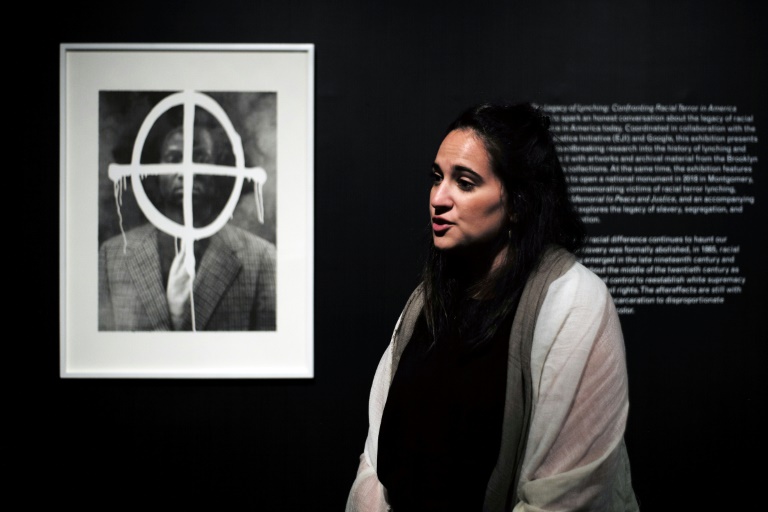A new exhibition is seeking to ignite a painful conversation in the United States about "racial terror" from the past by shedding light on the lynching of more than 4,000 African Americans.

Inspired by post-Apartheid reconciliation efforts in South Africa, memorials to genocide in Rwanda and German rehabilitation after the Holocaust, activists say US reconciliation on slavery and its aftermath is long overdue.
“The Legacy of Lynching: Confronting Racial Terror in America” opened on Wednesday and runs through September 3 at the Brooklyn Museum in New York’s most populous borough, home to a large African American population.
The exhibition showcases testimony from descendants of victims, contemporary African American art in response to racism, photographs and an interactive map showing where lynchings took place, the bulk of them in the American South.
There is a moving video about a family who traces a grandfather lynched in Shreveport, Louisiana for allegedly passing a note to a white woman.
More than 4,000 African American men, women and children were lynched in 20 states from 1877 to 1950, according to research carried out by the Equal Justice Initiative, headed by internationally acclaimed Alabama lawyer Bryan Stevenson.
They were often targeted for innocuous offenses, or on little or no evidence. White communities complicit in the violence and torture were never made accountable. More than six million blacks migrated North and West to escape.
“We’ve really done a poor job in this country in confronting this history of racial violence, this era of terrorism that so profoundly shaped America,” Stevenson told AFP.
“We really haven’t talked about slavery and its legacy. We haven’t talked at all about lynching. So I’m hoping this exhibit provokes a conversation that is long overdue and is necessary,” he added.
“We have unarmed African Americans being shot and killed by the police. There’s a lot of tension, there’s a lot of rage, there’s a lot of frustration about our lack of progress in achieving racial equality. And I think a lot of that stems from our failure to deal honestly with the roots of that,” he said.
– ‘Need to intervene’ –

Sara Softness, assistant curator of special projects at the Brooklyn Museum, says her team set up the exhibit with “utmost care and sensitivity”
Sara Softness, assistant curator, special projects at Brooklyn Museum, said the team mounted the exhibition with “the utmost care and sensitivity.”
“Perhaps we need to intervene,” she told AFP. “Art at its very best has that power to make you question and to challenge certain notions, and in that way culture can really be a catalyst for change.”
The exhibition closes with a video rendering of the first national memorial to the victims, which the EJI plans to open in Montgomery, Alabama by May 2018.
There are hundreds of memorials that honor defenders of slavery, champions of racial segregation and white supremacy across the South.
Stevenson draws a direct line between lynching and the fact that black Americans today are disproportionately more likely to be sentenced to death, incarcerated or subjected to police violence.
He calls the death penalty “the step-child of lynching.” States with the highest lynching rates are also those with the highest execution rates, he said.
Forty-two percent of those currently on death row are black. Blacks make up 34.5 percent of those executed in the United States since 1976, though blacks make up only 13 percent of the population.
The election of Donald Trump, who targeted Muslims, Mexicans and other population groups on the campaign trail, makes change more urgent than ever, Stevenson said.
“We’re not going to be a just society, we’re not going to be an evolved society if we allow fear and anger to target and demonize groups based on that group’s identity,” he said.
Stevenson has helped to win reversals, relief or release for more than 130 wrongly condemned death row prisoners, and won a ruling that mandatory life-without-parole sentences for children 17 or younger are unconstitutional.
Support Local Journalism
Add The Citizen as a Preferred Source on Google and follow us on Google News to see more of our trusted reporting in Google News and Top Stories.






